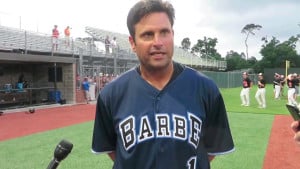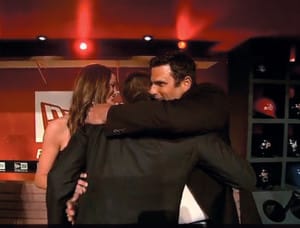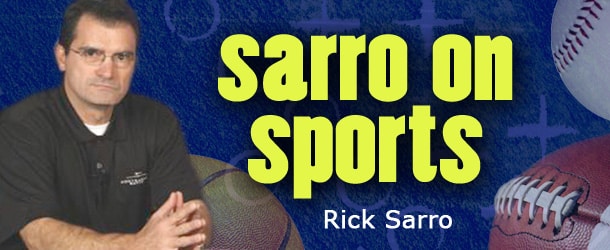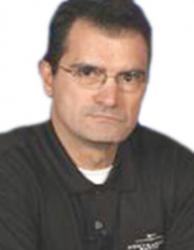He still cares for his baseball field as if it were a sacred, hallowed green at Augusta National.
And he espouses the magic of bunting and base running more than titanic home runs.
Barbe’s Glenn Cecchini is a rare high school baseball coach who has long been in rarified air, but is grounded to a simple life with a simple message.
“Impact someone’s life through baseball and Jesus Christ. That’s the gift. That’s the most important thing.”
Cecchini, a man of strong Christian faith, has been working that goal and message as Barbe’s legendary head coach for the past 27 years. It’s mind-boggling he’s been there that long because he looks 15 years younger than his 53 years.
Born in Oxnard, Calif., then raised in nearby Camarillo, Cecchini is now an adopted Louisiana native since arriving in Lake Charles in 1986 as a first-year Barbe assistant. He rose to the position of head coach in 1988, replacing Everrett Hannum after only one school year.
“I was a young, energetic assistant, and he was toward the end of his career and he asked me if I wanted to be the head coach at Barbe,” said Cecchini. “And I said, ‘Well, yeah, I want to be head coach.’ It was funny how it happened. No one wanted the job, and he was older and at the end of his career. He said, I’ll be your assistant and you the head coach. The principal at the time said yes.
“So we went 18-9 my first year; took second in district; and lost in the first round of the playoffs. And I have been head coach ever since.”
Over those 27 years, there have been hundreds of victories (749 district wins, to be exact); 20 5-A district titles; eight Louisiana state championships; one national championship; and now the crowning accomplishment — a Gold Medal in the 18-and-under World Baseball Cup, a prestigious international tournament played in Osaka, Japan, a few weeks ago.
The odyssey leading up to Japan began two years ago, as Cecchini began working the Tournament of Stars event in Raleigh, N.C., home to USA Baseball. From there, the next year it was time at the Trials. He was paying his dues, so to speak and learning the national system.
His star sons, Garin and Gavin, both played for the 18-and-under team, winning Gold Medals in 2009 and 2011 respectively. So dad Glenn was a known coaching commodity. He admits that his sons’ international tournament success and the state and national titles helped his case.
Earlier in the year, Shawn Cole of USA Baseball offered Cecchini the job, citing “his energy, motivational skills and gift of inspiration,” according to the Barbe coach.
Getting the revered job was easy in large part. Now the real work began.
Weeks of tryouts and player evaluations ensued, as 108 prospective players were whittled down to 40, and then the final 20, for the final traveling roster. These elite players “from all walks of life — from California, Florida, New York and Texas and different cultures,” according to Cecchini, had all of three days to practice before flying over 14 hours to Taiwan for a preliminary tournament as final preparation for the World Cup event in Japan.
“These 20 players are the best in the United States. They are very skilled. The pitchers all threw in the 90s. We had a closer named Reggie Lawson who threw upwards of 98 mph. These guys are tremendous players.”
But they couldn’t bunt.
That’s right. The best young baseball talent in the country, and Cecchini, the Yoda of small ball, had to teach them to bunt. “That’s the one thing [bunting] they [the players] did not buy into in the beginning. I told them to look at the Major Leagues — in the big games, they bunt. The St. Louis Cardinals bunted in the World Series.The bigger the game, the bigger the bunt is,” preached Cecchini.

“That was the number one thing — that, and the little things, like reading dirt balls and base running. How important that is.
“The reason they didn’t buy into it at first [was] not because they didn’t believe in me. They weren’t raised that way. Some of these kids have never bunted before in their life; have never read a dirt ball before.”
Cecchini’s passion about the use and skill of bunting runs deep. He can talk for hours about it. He’s won many one-run games because of it.
Even though it was a vast collection of top-flight, future professional talent, Cecchini didn’t really alter his coaching strategy and philosophy much. He took his successful Barbe approach to the game to Japan, stayed in the dugout “because of my enthusiasm and ability to coach them up,” and went 8-1 in World Cup competition.
Despite being the best of the best from the land where baseball began, this USA team hit a smidge over .200. So they had to manufacture runs the best they could, and “do what we had to do to win games,” said Cecchini.
Winning the gold came down to pitching, defense and that intangible skill of managing people and personalities.
In the professional and elite college game, knowing, teaching and executing the fundamentals gets you through the tunnel. Inspiring cooperation, team work, sacrifice and the handling of the head games of players separates the champion coaches from the rest of the pack.
Cecchini, who played collegiate baseball at then-USL, is a lifer at the high school level. More than 40 years of high school playing and coaching have led to Zen-like insights and mastery of managing players and coaches alike, where it matters most … between the ears.
“We [players and two assistant coaches] worked together extremely well. There were a lot of alpha males in there. I had coaches that were used to being the head coach, the head man. We meshed our coaching styles and techniques. Everybody was ego-free, I will say that. Everybody was all about winning the gold medal,” said Cecchini.
The goal of gold was achieved as the USA team avenged an earlier loss to Japan with the championship win, finishing up with an overall 8-1 mark.
Cecchini admitted this was — no question — the highest level of baseball he’s coached in his long career. All these players will soon be on Division 1 scholarships or awaiting the MLB draft.
Looking down the dugout of the very best young baseball talent the USA can offer doesn’t automatically mean you will prevail and win gold. The Chicago Bulls had Jordan, Pippen and Rodman. But coach Phil Jackson had to orchestrate how all that talent and those egos could play together. He did it well enough to win six NBA titles.
The USA under-18 team was coming off two straight gold medal international wins, so there were high expectations and pressure to make it a three-peat against some of the best competition in the world, from South Korea, Taiwan, Canada and Japan.
The Asian teams had a built in advantage according to Cecchini, as some, such as Taiwan, had been playing together for a couple of years. USA Baseball fields a new, revamped squad every year.
“Baseball is a global sport now. The world is extremely competitive, and the rest of the world is catching up to the United States,” said Cecchini, who kept the world at bay for at least one more year.
He said he felt “blessed” with the once-in-a-lifetime opportunity to represent his country. Very rarely, if ever, do the under-18 head coaches come back for an encore as the team and coaching staff rotates in fresh new faces.
The World Cup afforded Cecchini his first exposure to Taiwan and Japan. Overall, he described it all as an “amazing experience.” But, at times, there were challenges when it came to the culinary delights. “Our four star hotel in Osaka served American food. But there was a lot of octopus, sea urchin things and escargot. Strange that all the cooked vegetables were served cold, a lot of weird sauces and the eggs were always runny and the sushi was not like what we are used to here in the States.”
Once back home, Cecchini, married for 27 years to wife Raissa, was able to reflect on the journey and the accomplishment over home-cooked rice and gravy. His resume now includes an international gold medal championship to go with those Louisiana state titles, the national championship and his vast collection of district crowns.
You might conclude that winning the gold trumps all others, but that’s not the case.
“For me to say that this World Cup would be my proudest moment would slight all the kids and everyone involved in our Barbe program that did something no one else has done in Louisiana. Last year, we finished fourth in the district and won the state title. No one has ever done that. The year before, we won a state and national championship, and no one else had ever done that in the state’s history. Those two are every bit as equal as the World Cup Gold.”
The obvious next question for Cecchini is what’s next? What else is there to accomplish, to win, to adorn what is arguably the best career high school coaching record and resume in Louisiana sports history?
He admits the coaching Everest would be an undefeated season. But Cecchini says that next rung in the ladder would be unreasonable with the grind of a long season and the kind of difficult schedule he wants to play year in and year out.
The challenge he puts before himself, and what drives him to continue to toil at the ball park for those long, arduous hours, is simply to affect the lives of his young players and the kids he coaches at his many camps.
Also, using the “platform of baseball” to spread the blessings of Christ and impact the kids through his own faith and beliefs is important.
Most successful men strive to be the best in their fields, rise to the top of their professions; alpha males need to achieve and excel.
There comes a time when you slow down and take stock. Maybe you unfurl that wrinkled-up paper that you call your bucket list of things you want to do before it gets too late.
“I’m big on bucket lists. I want to climb the tallest mountain in North America with my brother-in-law. I haven’t jumped out of a plane yet. I definitely don’t have a death wish, but I would love to fly in an F-16 jet; drive one of those NASCAR cars. I’d love to travel more. I’m definitely a bucket list guy,” Cecchini said.
What’s not on his list is seeking a new professional challenge. Not anytime soon.

He’s looking at the nuts and bolts of his bottom line. Cecchini has 29 years in the Calcasieu Parish School System and wants to hit 33 years to secure a full retirement package.
You can’t fault him for that. Plus, that would keep him happy at Barbe for another four years, chasing state championships.
“I love Barbe. I love the kids. And I can make a real impact at this level.”
Four more years at Barbe would make the Bucs’ fan base and school officials quite happy.
Whenever retirement comes, odds are Cecchini won’t hang up his worn cleats. There’s still the next item on that bucket list.
“Coaching professionally entices me. To work and coach at a level I did not play interests me.”
He’s put 32 former Barbe players in the Major League Draft and another 110 on collegiate scholarships. He owns an astounding 81-percent post-season winning percentage, and tops that with an 84-percent win rate in the ultra-competitive 5-A district. There have been a total of 22 appearances in the national rankings to go with 24 state playoff berths.
History will decide if Cecchini is the best prep coach in the long history of Louisiana high school sports.
He gets my vote.
Cecchini has EverReady-like energy to burn. He talks fast and a lot. (Our scheduled 20-minute interview stretched over an hour.)
He knows baseball from the mound to home plate; first through third base; and between the foul lines to deep centerfield. There’s not much he couldn’t teach any player at any level.
Cecchini continues to stretch his imagination through motivation and inspiration. He is an endless source of phrases and learnings. One of his favorites: “What we know today doesn’t make yesterday wrong. It just makes tomorrow better.”
Everyday keeps getting better in a baseball life full of crowning moments.
Get Rick Sarro’s perspectives on sports on Soundoff 60, which airs Monday through Sunday nights at 9 pm on Suddenlink Channel 60 and Saturday and Sunday mornings at 10 am as well.

















Comments are closed.